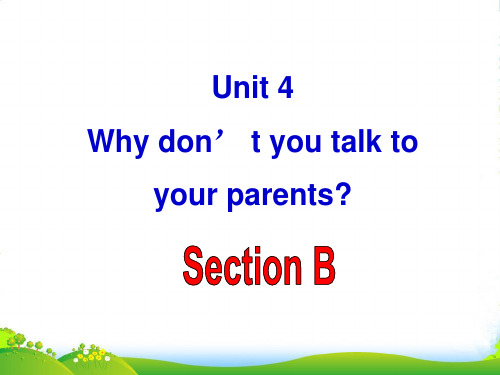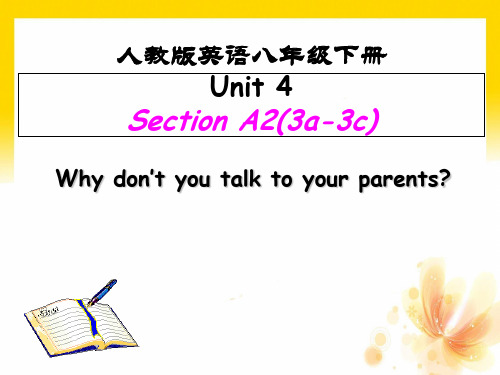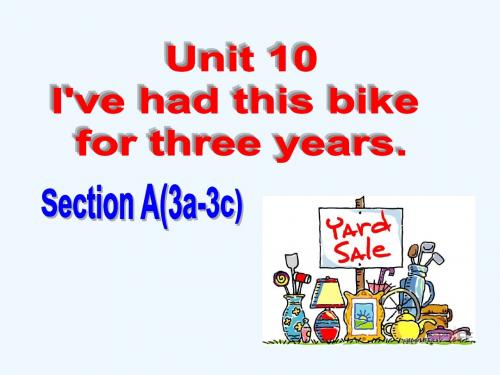英语人教版八年级下册2011人教版八年级下册Unit4SectionB3a-sc
- 格式:doc
- 大小:23.00 KB
- 文档页数:2

Unit4 SectionB2 (3a-Self check)参考教案一、教学目标:1. 语言知识目标:1) 复习though, as soon as, so …that等词的用法。
掌握生词perhaps。
2) 能够用英语表达自己的建议,并就自己所熟知的问题发表看法。
3) 能用本单元所学的语言简单表达对困难的一些建议。
2. 情感态度价值观目标:人的一生并不都是一帆风顺的,难免有一些挫折或困难,如果生活中发生了一些不尽如人意的问题,我们要学会冷静对待,学会合理的办法理性地解决。
二、教学重难点1. 教学重点:1) 能运用所学的语言知识来简单地表达自己对某一困难问题的看法和建议。
2)总结本单元所学到的重点词组及句型。
3)复习总结unless, as soon as, so that等词的用法,并能完成相关练习题。
2. 教学难点:运用所学的语言知识来写一封简短的信,表达自己对学生上课外辅导班这一社会现象的看法。
三、教学过程Step 1 RevisionReview the expressions and sentences.1. 一个典型的美国家庭 a typical American family2. 足球训练football training3. 删除cut out4. 比较;对比compare…with5. 逼得太紧push…so hard6. 一个儿童的成长 a kid’s development7. 疲惫的孩子们直到晚上七点钟后才到家。
The tired children don’t get home until after 7:00 p.m.8. 他们总是将自己的孩子与其他的孩子相比较。
They always compare their children with other children.9. 他们为什么不让孩子们顺其自然呢?Why don’t they let their kids be kids?10. 所有这些活动会给孩子们导致很大的压力。





Teaching DesignName Ma Leihong School Yuanshi Middle SchoolTextbook Pep English Book(Go for it!)Grade 8 Unit4 Why don’t you talk to your parents?Section A(3a)1.Teaching materialThe topic is about a boy’s problems and using ‘should’ or ‘could’ to give advice. It’s related to students’life and focuses on teenagers’mental health and moral education.2. StudentsAs for students, they have learned the drills to give advice and have the basic ability of learning by themselves. Nowdays they are in a crucial time of growing up. Most of them have too much stress or many problems. If they don’t solve them in time, they may easily get nervous.3.Learning aims1. Knowledge Object: Review the drills that give advice and input newwords: communicate, refuse, nervous….2. Ability Object:Try to master reading skills: Skimming, Carefulreading and Scanning for details.3. Moral Object:Find proper ways to solve problems.4. Importance and difficultyImportance: Improving reading ability and moral education .Difficulty: Understanding the text.5. Teaching and learning methods1. Use courseware to make the class lively2. Give students tasks and offer them reading methods.3. Design activity survey and debate competition to set off interest.4. Learn by themselves and by team group.6. Teaching StepsStep1 PresentationThe teacher show pictures and ask questions.Make conversations like this:Students try to guess the underlined words’ meaning.T:What problems do you think the boy might have?S1:I guess his parents often get into fights.T: Yes, his parents often argue with each other.They don’t get on with each other. How do you think he might feel?S2: I think he will be worried.T: Yes, nervous. What should he do?S3: I think he should talk with his parents.T: I agree with you. It’s important to have propercommunication.Design idea:Set off interest and lead in to the topic.Step2 ReadingTask1 Pre-reading.Read quickly to answer the questions.1. What’s wrong with the b oy?2. Who is giving advice?Design idea:learn to skim and get the main information.Task2 While-reading.Read the text carefully and fill in the form.Students guess the meaning of new words and can discuss.The teacher gives help if they have difficulties. Then check the answers.Problems AdviceHis parents____. ____are difficult. _____and ____around thehouse.His brother ______him. ______and ____his brother.His brother __him watch TV. He should ___ that he ____watching TV all the timeHe feels _____at home. He should __with his family.Design idea:I mprove their reading ability and understand the textbetter.Task3 After-reading.First, the teacher leads students to retell the text.Then students do it by themselves according to the form above.Design idea:Improve language using ability.Step3: Activity surveyThe teacher gives students these questions:Students talk about the problems in groups and give proper suggestions.1. Can you get on well with your family?2.Do you have any problems ?3.What should you do if you have problems?Design idea:Practice spoken English and learn to face problemsbravely and solve them properly.Step4: Debate competitionThe teacher divides students into pros and cons.Students talk about whether children should take after-school classes.They should state their ideas and give reasons or suggestions. Onereason for one point. The side that wins will get a prize.Design idea:Express themselves freely and take an active part in class. Step5: Sum upWhat have we learned today?What should we do if we have problemsStep6: HomeworkMake a survey about your friends’after-school activities. And write a passage about it including your ideas and suggestions.Design idea:Improve writing ability and prepare for Section B.7.Teaching reflectionAfter learning the text, students master reading skills and improve reading ability. They can learn to face problems bravely and solve them properly. But some students are shy and dare not speak in class. As a teacher, I encourage them to be brave.。
学科:英语年级:8 小组:姓名: 编制人:张盼盼审核人:
课题Unit 4Why don’t you talk to your parents?
Section B(3a-SC)
课型复习课
学习目标1.掌握本单元中的重点词汇,短语,并灵活运用,学会谈论问题和提出建议。
2.遇到问题要主动地去和家人,朋友,同学交流,要学会放松,缓解压力
重难点预设1.本单元重点词汇,短语,结构。
2.遇到问题要主动地去和家人,朋友,同学交流,要学会放松,缓解压力。
学习导航备注学习任务一:
1.认读并书写本课单词。
2. Revision
1. 一个典型的美国家庭_______________
2. 足球训练______________
3. 删除__________
4. 比较;对比__________
5. 逼得太紧__________
6. 一个儿童的成长_____________
7. 疲惫的孩子们直到晚上七点钟后才到家。
___________________
8. 他们总是将自己的孩子与其他的孩子相比较。
_____________________
9. 他们为什么不让孩子们顺其自然呢?_______________________
10. 所有这些活动会给孩子们导致很大的压力。
___________________
学习任务二: Talking,完成3a.
学习任务三: Writing 完成3b.
学习任务四:完成Self check。
达标检测
一.选词填空。
perhaps, skill, opinion, continue, push, compare, crazy, usual, typical, cause
1. Careless driving often ______ accident.
2. Twelve o’clock is the _____ time to have lunch.
3. He is a writer of great ______.
4. It was ______ of you to skate on such thin ice.
5. In my _______, people shall not smoke in public places.
6. If you _______ the two cars, you’ll find them very alike.
7. Will you help me to ___ up the window?
8. It’s a _______ Italian restaurant.
9. Please ________ what you were doing before I came in.
10. I’d like to go away, ________ France or so mewhere.
二.根据汉语提示,完成下列句子。
1. 你怎么了?What’s ________ with you?
2. 我父母不允许我与朋友外出闲逛。
My parents don’t ____ me ___ hang ___ with my friends.
3. 尽管他错了,但那又不是一件大事。
_________, he’s wrong, it’s not a _____ ____.
4. 其次,为什么不坐下来与你弟弟进行交流?
________, why don’t you sit down and __________ _______ your brother?
5. 相反,他看自己所喜欢的一直到深夜。
________, he watches ________ he wants ______ late at night.
6. 他应该和朋友交谈一下,以便于他可以说一声对不起。
He ______ talk to his friends ____ ______ he can say he’s sorry.
7. 为什么不让孩子们顺其自然呢?
Why don’t they _____ the ______ _____ kids.
8. 人们不应该逼孩子们太紧。
People shouldn’t ____ their children so ____.
当堂小结:
这节课我学到了什么?我对自己的表现满意吗?。